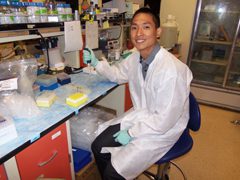Edwin Liu Rose Hills
Clarifying the Mechanisms of Ergothioneine Depletion in Sickle Cell Disease (SCD)
Sickle Cell Disease is a disorder in which a point mutation in the -globin gene causes a structurally unstable form of hemoglobin (HbS). This instability generates higher levels of superoxide and hydrogen peroxide that cause rapid oxidation of erythrocyte (Red Blood Cell) membranes, and subsequently promotes polymerization of HbS, forming the sickling in Sickle Cell Disease. The pro-oxidant effects of the HbS mutation lead to rapid hemolysis, blockage of microvasculature, and release of reactive agents that further cause peripheral tissue damage. HbS is more redox active and more prone to act as a heme peroxidase relative to regular hemoglobin, and our lab has hypothesized that Ergothioneine, an antioxidant, is preferentially depleted by hemoglobin peroxidase activity. To test this hypothesis, I will modulate cellular hemoglobin peroxidase activity and determine its effect on the oxidation on the major intracellular antioxidants ascorbate (Vitamin C), glutathione, and ergothioneine.
Message To Sponsor
I am deeply grateful for the SURF/Rose Hills sponsors to have given me an opportunity to devote my summer to full-time academic research in the laboratory which I have worked for over a year. I have no doubt that this opportunity will assist me in mastering many laboratory techniques as well as helping me develop into a more mature individual in my field of research. I would also like to thank Dr. Bruce Ames, his staff scientist Dr. Jung Suh, and the rest of his staff for continually being effective mentors and helping me achieve this great fellowship.